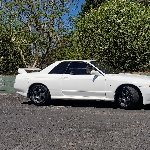Help! I Keep Warping Exhaust Manifolds And Turbo Housings
Announcements
-
Similar Content
-
Latest Posts
-
By funkymonkey · Posted
no just don't want the one I have atm. It's too stock and pristine to mod. Wanna buy a 0.34 Skyline that I can put the remaining 0.66 skyline parts on to make 1 skyline. -
The front foot path. There's a little Asian bloke that drives around with a ute all the time. Lucky to have anything vaguely metal left on the footpath within 4 hours.
-
Drill hole to release pressure. Draw circle around hole with pink paint pen. Put in scrap metal bin/take to scrappy's. Walk away.
-
I booked a council pick-up for a bunch of stuff and left them out the front, with all rubbish to be picked up, on the top with other bits of scrap metal, the arvo before pick up. Inevitably the metal scrap guys turn up and take all the metal that arvo. They must have a deal going cause they certainly know what addresses to show up at ! Works every time !
-







Recommended Posts
Create an account or sign in to comment
You need to be a member in order to leave a comment
Create an account
Sign up for a new account in our community. It's easy!
Register a new accountSign in
Already have an account? Sign in here.
Sign In Now